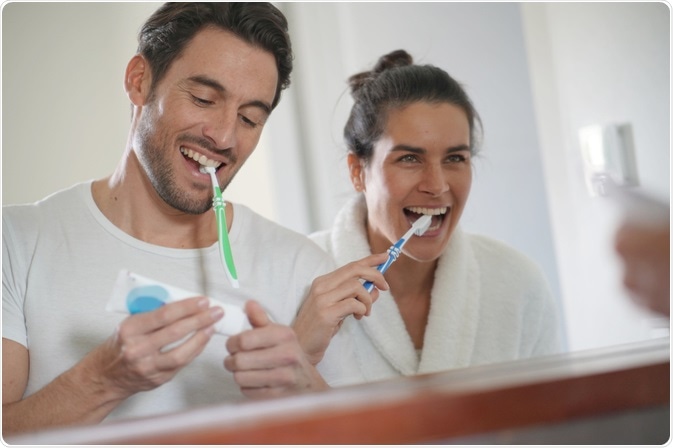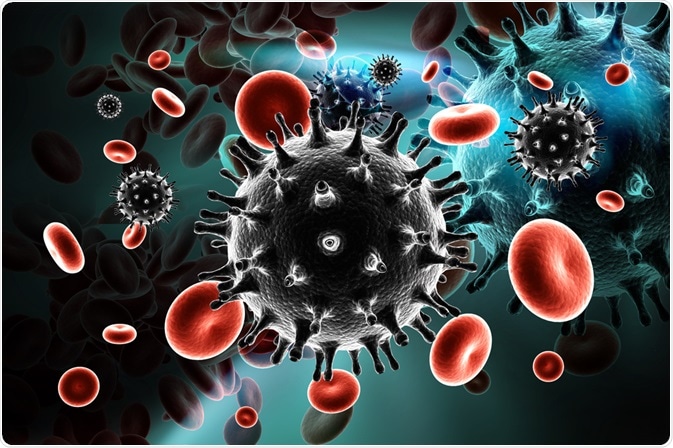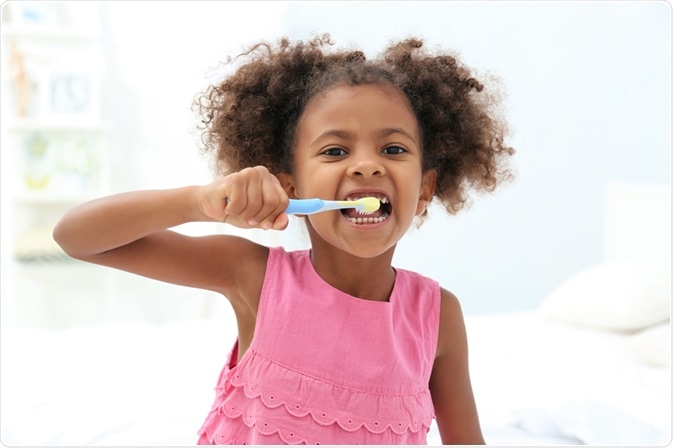Toothbrushes are a part of routine dental care that get exposed to millions of bacteria post brushing. A clean toothbrush is imperative for an effective daily dental care process; however, the importance of practicing hygienic dental practices attains more importance especially in the current scenario of the COVID‑19 breakout.

Image Credit: goodluz/Shutterstock.com
Does the exchange of saliva pose a threat to spreading infections?
Human saliva is composed of components such as enzymes and antibodies, which shield against various infections; however, the saliva of an infected individual becomes a source for transmission of various infections as it is loaded with harmful viruses and bacteria.
During recent times, it has been established that viruses such as coronavirus can spread from one individual to another through saliva. Below is a list of various diseases which can spread via contaminated saliva:
- Viruses such as rhinovirus which causes the common cold, flu virus, herpes virus and Epstein-Barr virus, Ebola and bird flu virus
- Infections like Hepatitis C and B and Cytomegalovirus.
- Bacterial infections caused by Streptococcus bacteria which can lead to dental caries and serious infections like MRSA
There is a wide range of viral infections that can be transmitted via saliva but certain viruses like HIV (Human immunodeficiency virus) do not spread through saliva. However, a direct exchange of saliva via kissing increases the risk of transmission of HIV infection.

Image Credit: RAJ CREATIONZS/Shutterstock.com
Is toothbrush sharing more dangerous than kissing or sharing food?
Dentists strictly warn against sharing toothbrushes even amongst the family members. However, despite this awareness around 26% of Britain’s end up sharing their toothbrushes with their friends, family, partner, or even with neighbors.
The results collected from polls revealed that men (32%) had a higher tendency to share their toothbrush compared with females (20%). Also, the elderly were found to be least likely to share their toothbrushes when compared with youngsters among the same family group.
Even though kissing can also cause the exchange of saliva, according to experts sharing of toothbrushes can be more unsafe. This is because gums may bleed during the tooth brushing process which can stain the brush with blood, thereby leaving the brush with a host of various infections.
What does the research reveal about sharing toothbrushes?
Various studies have been conducted to understand toothbrush contamination post tooth brushing. One such study concluded that toothbrushes of both healthy and diseased individuals were loaded with bacteria such as Staphylococcus aureus, Pseudomonas, and E. coli. Hence, it can be concluded that toothbrush sharing with a healthy individual can pose serious health concerns.
Research has also revealed that toothbrushes used by individuals suffering from oral diseases leave their brushes contaminated post usage. This study also highlighted that re-brushing with an infected toothbrush can quickly reintroduce the same infection, thereby increasing the chances of sustenance of prevailing disease over an extended period.
Toothbrush sharing could result in serious health effects in immunocompromised patients like HIV positive or cancer patients, as it can lead to the introduction of various organisms in their systems.
Special attention should be paid when children are tooth brushing, as many times they may inadvertently exchange toothbrushes with their family members. Brushing should be done under parental guidance during the early years of childhood.
To avoid mixing up the toothbrushes, it is a better idea to label the toothbrushes.

Image Credit: Africa Studio/Shutterstock.com
What can be done to keep the toothbrush clean?
There are simple home care tips which can be followed to keep a toothbrush free of germs, as listed below:
- Never share your toothbrush even with your closest family member. It is recommended to wash off the toothbrush with running tap water and then leave it to dry off.
- Avoid keeping a toothbrush in a horizontal position, it is advisable to keep toothbrush up and erect.
- It is not advisable to immerse toothbrush in any disinfecting solution as it may harbor microorganisms under the appropriate conditions.
- It is not recommended to use devices like microwaves or dishwashers to clean a toothbrush as they may derange the toothbrush and would leave them not appropriate for use.
- Many modern toothbrushes come with a cap that can be placed post brushing. It is not advisable to cap the brush after use as it creates an ideal environment for bacterial growth.
- Discard your toothbrush after 3 to 4 months as its prolonged usage damages the texture of the toothbrush, thereby leaving it inappropriate for further use.
Last Updated: Jun 2, 2020